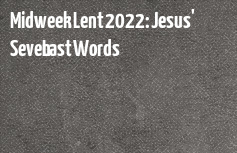Father, Forgive Them
Preacher: Rev. Jack Meehan Series: Midweek Lent 2022: Jesus' Seven Last Words Category: Biblical Scripture: Luke 23:34
Midweek Lenten Meditation
March 9, 2022
Luke 23:34
“Father, forgive them; for they know not what they do.”
Epitaphs – carved into stone, wood or metal – they offer a lasting message long after loved ones die and memories fade. Through poetry, Scripture, and prose, epitaphs seek to sum up in one last message the life and purpose of those for whom they stand. But Jesus had no epitaph. Instead, during the final hours of his life, Jesus mapped out his way of suffering with seven last words, remembered and recited throughout the ages; touchstones along his way of sorrow. The meditations for these midweek Lenten services will focus on Jesus’ seven last words as found in the Gospels. They provide glimpses into his suffering and loving final thoughts. And so we listen to them as Jesus speaks to us even now. Today we focus on the first of Jesus’ final words: “Father, forgive them; for they know not what they do” (Luke 23:34).
Who was Jesus talking about when he uttered these words? Who are the people at the foot of the cross who didn’t know what they were doing? The soldiers? Pontius Pilate? Herod? The religious leaders?
The soldiers knew what they were doing. This was their job, their assignment as directed by their commanding officer. A job’s a job, and somebody’s got to do it, even when it’s unpleasant. Someone’s got to do the dirty work. Pontius Pilate knew what he was doing as he tried to find some way to cover up what he was doing: sending Jesus to Herod, washing his hands, making other people say that they were to blame. Pilate was doing what he felt could not be avoided. He did what he had to do. Herod knew what he was doing by ducking the issue; providing an answer by finding a way not to answer; seeking to cover up his own indecision by finding a way to shift the responsibility for action or inaction onto someone else. The religious leaders knew what they were doing by finding a way to arrest Jesus by stealth; bringing him to a trial by night which was illegal; stirring up the crowds; bending Pilate’s will to their own for the sake of expediency in order to hold onto their power. They knew exactly what they were doing. Simon Peter knew what he was doing when he denied knowing Jesus three times. Hoping to save himself and slink back into the darkness, he sought to disown the very One he had left everything to follow. Judas Iscariot certainly knew what he was doing when he betrayed Jesus for thirty pieces of silver. The plot and the kiss in Gethsemane had all been mapped out with precision and care. Even the criminals who were crucified with Jesus knew what they were doing and why they were there as the one criminal spoke out to the other: “We are receiving the due reward of our deeds” (Luke 23:41).
We look at all of these individuals and realize that they knew what they were doing, but do we see this in ourselves? When we, like the soldiers, are just doing our job and not questioning whether what we are doing is just and fair… When we, like Pontius Pilate, desperately seek out some way to cover up what we are doing and shift responsibility… When we, like Herod, give answers that are no answers at all… When we, like the religious leaders, do anything to hold onto power… When we, like Peter, pretend to be someone we’re not in order to stay in the shadows… When we, like Judas, are willing to betray someone near and dear to us. When we, like the criminals, are receiving the due reward of our deeds… Jesus prays for us: “Father, forgive them; for they know not what they do.”
Already in the first of his seven last words, Jesus lays bare our pretensions and excuses, causing us to stand naked before the judgment seat of God. As in the Garden of Eden long ago, so today the Lord God sees through those things which we seek to justify in our own lives in order to cover up ourselves. All is in need of forgiveness – God’s forgiveness – for all that we have done and for all that we have left undone. The prayer which Jesus utters is fulfilled in the shedding of his own blood on the tree of the cross. It is in the cleansing blood of Jesus alone that we receive forgiveness of sins, life, and salvation. May the wonder and awe of this blood-bought gift stir our hearts and minds to new and deeper faith in him who prayed: “Father, forgive them; for they know not what they do.” Amen.
other sermons in this series
Apr 13
2022
Into Your Hands I Commit My Spirit
Preacher: Rev. Jack Meehan Scripture: Luke 23:44–46 Series: Midweek Lent 2022: Jesus' Seven Last Words
Apr 6
2022
I Thirst and It Is Finished
Preacher: Rev. Jack Meehan Scripture: John 19:28–30 Series: Midweek Lent 2022: Jesus' Seven Last Words
Mar 30
2022
My God, My God, Why Have You Forsaken Me?
Preacher: Rev. Jack Meehan Scripture: Matthew 27:45–46 Series: Midweek Lent 2022: Jesus' Seven Last Words
